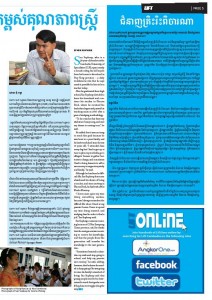Critical Thinking
One of the crucial goals of education is to permeate critical thinking for students. You are engaging in process of critical thinking when you weigh evidence, analyze points of view, and evaluate the outcomes of a decision. Critical thinking requires you to judge thing reasonably about issues by considering evidence and using clear criteria to guide your decisions. Those criteria including consider all relevant evidence, develops criteria for making reasoned judgments, make judgments on the basis of these criteria, and works on developing the character traits, or habits of mind that promote effective decision making.
Actually, you make choices every day — at school, at home, with friends, and at work. For example, you may need to decide whether to join an after-school activity, whether to support a friend in demonstration, or how to plan your courses for the year.
Utilizing criteria to guide your decisions will help you achieve in school. Furthermore, the benefits of utilizing criteria to guide your decisions go well beyond the social studies classroom. Developing effective criteria will ensure that you make the most effective choices when faced with challenges in all aspects of your life.
Habits of Mind
Habits of mind to promote critical thinking and effective decision making are essential. Whether you are completing a social studies assignment or dealing with other challenges, these habits of mind can help you achieve success at school and in life.
What habits of mind or critical thinking you have pursued?
– I’m an active thinker – I explore alternatives and consider their strengths and weakness
– I am curious – I take time to think about things and explore unanswered questions.
– I’m flexible – I don’t reject ideas just because they are contrary to my point of view.
– I’m open-minded – I’m open to the views of others, especially when their views are different from my own.
– I’m collaborative – I’m willing to work with others to brainstorm and combine ideas.
– I’m empathetic – I listen to and try to understand others’ points of view.
– I’m respectful – I listen carefully to others.
– I’m thoughtful – I think before I act. I consider the consequences of various alternatives.
Critical thinking can be empowered by different levels: individual training and external circumstances. Below premises are essential for development of critical thinking:
- Family: parents should raise their children in a way of allowing them to think, speak and act freely without interrupting or intimidating them. However, that freedom must be delineated by the appropriate rules.
- School: teachers must instruct students in the way of student-centered approach, not teacher-centered tradition. Teachers are the facilitator for students to think, speak and act freely.
- Government: top political leaders must encourage citizen participation and manage independent mass media to allow people to think, speak and act collectively.
By Sophan Seng
Facilitator for Khmer-Canadian Buddhist Cultural Center and President of Khmer Youth Association of Alberta


Pingback: EDDIE
Pingback: WILLIE
Pingback: JESUS
Pingback: JEREMIAH
Pingback: WADE